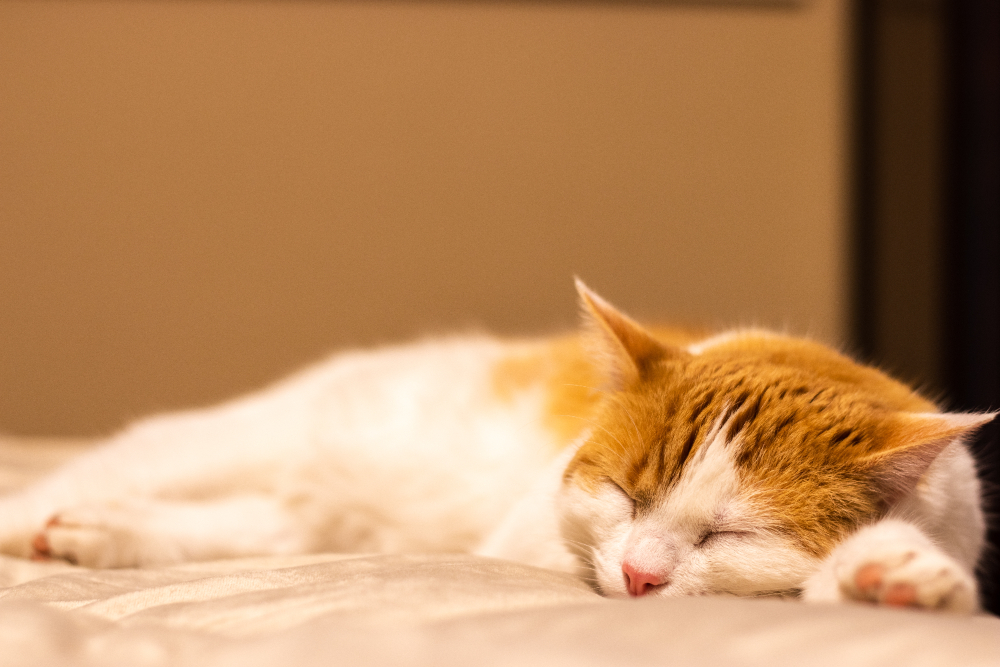A Complete Guide to Your Cat's Lifespan

A Complete Guide to Your Cat's Lifespan

Cats are cherished companions that bring joy, comfort, and love to many households. Their independent yet affectionate nature endears them to millions of pet owners worldwide. If you're a cat parent, understanding your feline friend's lifespan and how to support their well-being throughout every stage of life is crucial. For families in Jupiter, FL, seeking compassionate care for their feline companions, exploring options like in-home euthanasia when the time comes can ensure a peaceful and loving experience.
This guide will take a closer look at a cat's lifespan, the factors that influence longevity, and key tips to ensure your furry friend leads a healthy and happy life.
How Long Do Cats Typically Live?
On average, a cat's lifespan ranges from 12 to 18 years, though many cats live well into their twenties with proper care. The oldest known cat, a Texan feline named Creme Puff, lived to an astounding 38 years old!
Indoor vs. Outdoor Cats
The environment plays a significant role in a cat's longevity. Indoor cats, protected from environmental threats and encouraged by consistent veterinary care, tend to live longer than outdoor cats.
- Indoor cats often live 12-18 years and beyond.
- Outdoor cats, on the other hand, face risks like accidents, predators, and disease, with lifespans averaging 5-7 years.
Breed Factors
Breed can influence lifespan. Mixed-breed cats often have diverse genetic makeups that grant them increased resilience, while certain purebred cats may face breed-specific health challenges. For example:
- Siamese Cats: Often live up to 15-20 years.
- Maine Coons: Average lifespan of 10-13 years.
- Persians: Typically live 12-16 years but are prone to respiratory issues due to their flat faces.
Despite breed tendencies, individual care factors often play the bigger role in a cat's longevity.
Factors That Affect a Cat's Lifespan
While genetics and environment contribute to a cat's lifespan, proper caregiving is essential. Here are some of the top factors that influence your cat's health and longevity:
1. Diet and Nutrition
A balanced, high-quality diet is essential for your cat's overall health. Whether you're feeding dry kibble, wet food, or a combination, ensure your cat receives the correct nutrients for their age and health conditions. Overfeeding can lead to obesity, which is a significant risk factor for diabetes, joint problems, and heart disease.
2. Routine Veterinary Care
Cats are stoic creatures and often hide symptoms of illness. Regular veterinary checkups can help identify health issues early, increasing the chances of successful treatment. Vaccinations, parasite control, and dental cleanings are essential aspects of preventative care.
3. Spaying or Neutering
Spaying or neutering not only helps control the feline population but can also reduce the risk of diseases like uterine infections, mammary tumors, and certain cancers.
4. Mental and Physical Stimulation
Keeping your cat active and engaged can improve both their physical and mental well-being. Provide activities like climbing trees, interactive toys, or puzzle feeders to keep them stimulated.
5. Disease Management
Cats can develop chronic conditions, such as kidney disease, arthritis, or hyperthyroidism, in their later years. Early diagnosis and treatment can improve your pet’s quality of life and longevity.
Life Stages of a Cat
Understanding the different stages of a cat's life can help you provide age-appropriate care.
Kitten (0-1 year)
Kittens grow rapidly and are highly curious. This phase requires high-quality kitten food to support growth and lots of socialization to nurture trust and good behavior.
- Frequent vet visits for vaccinations and wellness checks are essential.
- Introduce grooming and litter box training early.
Young Adult (1-6 years)
This is a cat's prime! Maintain physical activity, a consistent diet, and routine vet care to ensure optimal health.
- Spaying or neutering should be completed during this phase.
Mature Adult (7-10 years)
Cats in this stage may begin to slow down and show signs of aging.
- Watch for subtle changes in weight, appetite, or energy levels—they may signal an underlying issue. Regular wellness exams (at least annually) are crucial.
Senior Cat (10+ years)
Older cats are more prone to chronic conditions.
- Feed them senior-specific diets that are easy to digest and provide joint support.
- Consider semi-annual vet visits to stay ahead of age-related concerns.
Supporting Your Cat's Final Years with Compassion
As cats age, you'll need to provide more thoughtful care to ensure their comfort in their golden years.
The decision to consider end-of-life care, including in-home euthanasia, is one of the hardest parts of being a pet owner. However, it's a profound act of love to ensure that your cat's final moments are peaceful and pain-free. This option allows your pet to remain in the comfort of their home, surrounded by loved ones, which can significantly reduce stress during their final moments.
The Role of In-Home Euthanasia
Choosing in-home euthanasia provides a compassionate and private alternative to traditional veterinary clinics. For cat owners in Jupiter, FL, services like Rover Veterinary Care ensure that this delicate process is handled with dignity and respect. Benefits include:
- Comfort for Your Pet: Reduce stress by keeping your cat in a familiar environment.
- Family Presence: Be surrounded by family for emotional support.
- Tailored Experience: An in-home vet tailors the process to your pet's specific needs, ensuring gentleness and care.
How to Know It's Time
Recognizing when it's time to say goodbye can be one of the most challenging aspects of being a pet parent. Consult with your veterinarian to evaluate your cat's quality of life. Some signs that it may be time include:
- Chronic pain that cannot be managed
- Severe loss of appetite or weight
- Difficulty breathing or persistent fatigue
- Loss of interest in favorite activities
Creating a Supportive Community in Jupiter, FL
You're not alone in your love for your feline friend. Jupiter, FL is home to vibrant pet owner communities that share stories, advice, and reviews of services like in-home euthanasia. Reaching out to others who've walked a similar path can help you feel supported and empowered in making decisions for your cat.
Consider partnering with a local veterinary service that specializes in compassionate care during all stages of your cat’s life. Rover Veterinary Care provides both preventative wellness services and end-of-life options tailored to the unique needs of pet owners in Jupiter, FL.
Celebrating the Bond You Share
The bond we share with our cats is special. They’re not just pets; they’re members of the family. Every moment—playful meows, warm cuddles, or quiet companionship—adds fulfillment to our lives.
While saying goodbye might be the hardest part, it is also an opportunity to honor the love and joy your cat has brought into your home. With services like in-home euthanasia, families in Jupiter, FL can say farewell in the most loving and peaceful way possible.
Final Thoughts
Your cat's lifespan may never feel long enough, but by providing excellent care at every stage, you ensure that their years are filled with comfort, health, and happiness. From lively kittenhood to serene senior years, their life is enriched by the bond they share with you.
When the time comes, consider compassionate options like in-home euthanasia to match the dignity and love your cat deserves. If you need veterinary advice or wish to discuss in-home euthanasia in Jupiter, FL, contact Rover Veterinary Care today. Our dedicated team is here to walk with you through every step of your cat’s incredible life story.
